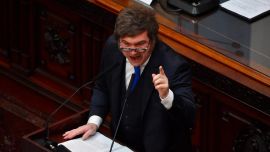The conclusion is that Cristina Fernández de Kirchner did it.
Argentina's vice-president had been asking for the resignation of President Alberto Fernández's economic team.
First she drove Matías Kulfas away from the Productive Development Ministry. He was replaced by Daniel Scioli.
Now, with her latest inflammatory speech, the former president ratified her disagreement with the government's progress and forced the departure of Economy Minister Martín Guzmán.
In recent weeks, pressure on Guzmán had intensified, both from the markets and from the Kirchnerite wing of the government. Fernández de Kirchner recently denounced, in another harsh speech, the "festival of imports."
The economy and the Central Bank reacted last week by instituting a sort of import surcharge that exacerbated pressure on the dollar and pushed Argentina's country risk above 2,400 basis points – a level almost close to default levels.
With this latest 'supercepo,' the Central Bank managed to bringin more than US$1 billion in just a few days, and the second-quarter targets of the agreement with the International Monetary Fund were deemed to have been met.
The sustainability of this economic policy and of Guzmán himself, however, was becoming increasingly compromised, as evidenced, for example, by yesterday's statements by Andrés Larroque, Buenos Aires Province's social development minister and a spokesman for La Cámpora and Kirchnerism as a whole, who declared that "the period of moderation" had come to an end.
Problems and more problems
Guzmán, moreover, had already faced serious problems in sustaining the financing of the government's economic programme through the placement of inflation-adjustable peso bonds, whose price fell sharply in the last two weeks, casting serious doubts over the sustainability not only of bond prices – which the Central Bank went out to support, through purchases that it financed by force of monetary issuance – but also of overall economic policy.
The evidence that the conflict between the president – his main political support – and the vice-president – his main doubter – showed no sign of abating, as was once again evident in two speeches in 24 hours – one on Friday by Alberto Fernández and one on Saturday by Cristina Fernández de Kirchner. These may have prompted Guzmán's definitive decision to walk, which prompting immediate and numerous rumours and operations concerning his replacement.
In recent weeks, Cristina Fernández de Kirchner held meetings with more orthodox economists, such as the former president of the Central Bank, Martín Redrado, and veteran economist Carlos Melconian, severe critics of Guzmán's economic policy and, more generally, of Alberto Fernández's administration, which is beset not only by the economic crisis but also by growing political uncertainty.
In early June, Kulfas' dismissal from the Cabinet has also left Guzmán without his main ally in the Cabinet.
There is now an increasingly depopulated Albertista camp in the Cabinet.
related news
by José Calero, Noticias Argentinas
























Comments